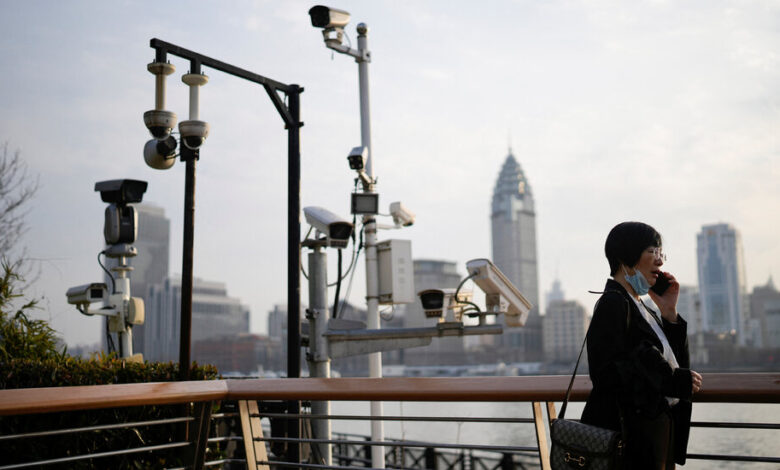China to Its People: Spies Are Everywhere, Help Us Catch Them

Beijing sees forces bent on weakening it everywhere: embedded in multinational companies, infiltrating social media, circling naïve students. And it wants its people to see them, too.
Chinese universities require faculty to take courses on protecting state secrets, even in departments like veterinary medicine. A kindergarten in the eastern city of Tianjin organized a meeting to teach staffers how to “understand and use” China’s anti-espionage law.
China’s Ministry of State Security, a usually covert department that oversees the secret police and intelligence services, has even opened its first social media account, as part of what official news media described as an effort at increasing public engagement. Its first post: a call for a “whole of society mobilization” against espionage.
“The participation of the masses,” the post said, should be “normalized.”
China’s ruling Communist Party is enlisting ordinary people to guard against perceived threats to the country, in a campaign that blurs the line between vigilance and paranoia. The country’s economy is facing its worst slowdown in years, but China’s authoritarian leader, Xi Jinping, appears more fixated on national security and preventing threats to the party’s control.
“We must be prepared for worst-case and extreme scenarios,” Mr. Xi told China’s National Security Commission in May. He called on officials to “enhance real-time monitoring” and “get prepared for actual combat.”
The sense of urgency may be heightened by the fact that Beijing is confronting some of its biggest challenges since Mr. Xi’s ascension more than a decade ago. Beyond the economic gloom, China’s relations with the West are increasingly tense. And unexplained personnel changes at the highest tiers of power — including the sudden removal in July of China’s foreign minister and two high-ranking generals — suggest that Mr. Xi may have feared threats to his control.
In July, China revised its anti-espionage law to broaden an already sweeping scope of activities that it regards as spying. It is offering rewards of tens of thousands of dollars to people who report spies.
While the call for mass vigilance has inspired widespread caution, it is unclear to what extent that is translating to action on the ground. In the last month, the authorities have announced the capture of at least four spies, including two men recruited by the C.I.A., but some of the cases appeared to be old ones belatedly announced, such as a married couple arrested in 2019.
The authorities also said earlier this year that they had sentenced an American citizen to life in prison for espionage, and they arrested a high-ranking Chinese newspaper editor while he was dining with a Japanese diplomat. (The editor’s family has called the charges trumped up.)
“The push reflects the profound legitimacy challenges and crisis that the regime is facing,” said Chen Jian, a professor of modern Chinese history at New York University. Professor Chen said the call to mass action bore echoes of the sweeping campaigns that Mao Zedong unleashed in part to consolidate his own power. The most notable was the Cultural Revolution, a decade-long period of chaos and bloodshed when Chinese leaders urged people to report on their teachers, neighbors or even families as “counterrevolutionaries.”
Chinese society would not be as easily stirred into a mob frenzy now, given how the country has modernized, Professor Chen noted. And China does have grounds for wariness: The C.I.A. director, William Burns, said recently that America was rebuilding its spy network in China.
Nor is China alone in adopting increasingly dire warnings about foreign influence. Some have warned that Washington is fanning a new Red Scare, such as through the Justice Department’s now-scrapped China Initiative targeting academics. The United States and other Western countries are also working to restrict access to TikTok, the Chinese-owned short video app, citing security concerns.
But China’s approach stands out for its scale and ubiquity.
On high-speed trains, a video on loop warns passengers to be careful when taking photos for social media, in case they capture sensitive information. In government offices where residents file routine paperwork, posters remind them to “build a people’s defensive line.”
One local government in Yunnan Province published a video of men and women in the traditional dress of the Yi, an ethnic group there, dancing and singing cheerily about China’s national security law.
“Those who don’t report will be prosecuted. Covering crimes will lead to jail,” the performers sang as they fanned out in a circle, the women fluttering their bright yellow, blue and red skirts.
Other forms of anti-espionage education are more formal. The National Administration of State Secrets Protection runs an app with an online course on secret-keeping, which many universities and companies have ordered their staff to complete. The first lesson opens with a quotation from Mao Zedong on the importance of confidentiality; a later one warns that iPhones and Android devices are foreign products and may be vulnerable to manipulation.
One hotel, in the seaside city of Yantai, usually advertises beach getaways and dinner deals in its social media posts. But last October, it published an infographic about the groups the security ministry had deemed most at risk of co-optation by foreign enemies. They included people who had studied abroad and “young internet users.”
Young Chinese are an area of particular concern, especially after widespread protests last year against China’s harsh Covid restrictions. Some participants were college students who had been locked down on their campuses for months. And now many young people face a spate of other problems, including record unemployment.
But the authorities have attributed discontent to outside instigators. After last year’s protests, a Chinese official said attendees had been “bought by external forces.”
Chinese academics are still pushing that idea. At a conference on international relations organized by Beijing’s prestigious Tsinghua University in July, one scholar suggested that the protesters had fallen prey to “cognitive and ideological manipulation” by countries including the United States. Such efforts by “hidden forces” were growing harder to detect, said the professor, Han Na, from People’s Public Security University, the country’s top police academy.
“Some call them spies, some call them special operations. They’re the people among us who are from some special departments.”
She added: “That’s why we have our current problem.”
Part of the authorities’ solution is teaching young people to be more on guard. Mr. Xi has called for expanding national security education, and universities have created squads of students tasked with reporting people who, among other things, use overseas websites.
But the constant exhortations also remind students that they, too, are being watched. University students in Beijing have been questioned by the police or administrators for exchanging messages with New York Times journalists — in at least two cases, before any article had been published.
Perhaps the central effect — or goal — of the campaign has been to make even the slightest connection to foreigners grounds for suspicion. That has extended to cultural fields where exchange has historically been richest.
Some academics have stopped meeting with foreigners. Venues across China have canceled performances by foreign musicians.
The cancellations surged in May, amid a crackdown on cultural events deemed out of step with the party’s agenda. But months later, scrutiny remains intense, said Brian Offenther, an American D.J. in Shanghai. In one week in August, venues in three different cities told him they could not host him. One said that the police had threatened to shut down the venue if a foreigner performed, according to a chat screenshot Mr. Offenther shared. Another said simply, in English: “It is not the right time for foreign D.J.”
Beijing has not issued any clear directives about contact with foreigners; it maintains that China remains open, lauding the importance of foreign investment. But the signals are contradictory. This spring, the authorities raided or questioned the offices of several American consulting and advisory firms, accusing one of trying to obtain state secrets through Chinese experts it hired.
Even sharing a name with a foreign organization can invite scrutiny, as a volunteer group in Guangzhou found out when they were forced to cancel a speaker conference scheduled for August under the name TEDxGuangzhou.
TED, the U.S.-based company known for speaker showcases, allows groups to use the TEDx branding for free, and the Guangzhou group had no other affiliation with it, the organizers said in a statement. TEDx conferences have taken place in Guangzhou since 2009. Still, the police said this year that the volunteers could not proceed unless they registered as a foreign nongovernmental organization.
Some Chinese have reacted skeptically to the call for constant vigilance.
When an airport in Hunan Province recently banned Teslas from its parking lots, arguing the American company’s cars could be used for spying, some social media commenters asked whether Boeing jets should be banned too. Even Hu Xijin, the retired editor of Global Times, a nationalist party tabloid, wrote online that it was worrisome that academics he knew were avoiding foreigners.
But officials have brushed off concerns. In an editorial about the call for mass mobilization, Global Times said it was critics who were the paranoid ones.
“If you haven’t done anything wrong,” it said, “why are you so scared?”
Siyi Zhao contributed research from Seoul.




